IFFR 2011: An interview with all directors of Kaidan! Tsukamoto! Kore-eda! Ochiai! Lee!
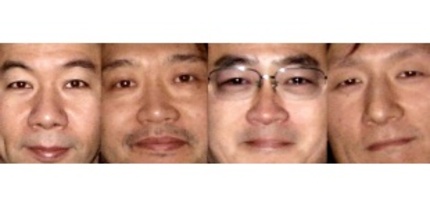
But one of the BIGGEST surprises was that all four Japanese directors had been flown into Rotterdam as well! Tsukamoto Shinya, Kore-eda Hirokazu, Ochiai Masayuki and Lee Sang-il are all directors worth interviewing in their own right, but ScreenAnarchy got a private session with all four simultaneously.
Also present was producer Hamano Takahiro who was officially not being interviewed but who we dragged into the conversation a few times.
Thankfully this meeting happened after I saw the film, loved it, and reviewed it (yes, this is a link).
So what happened? Read on!
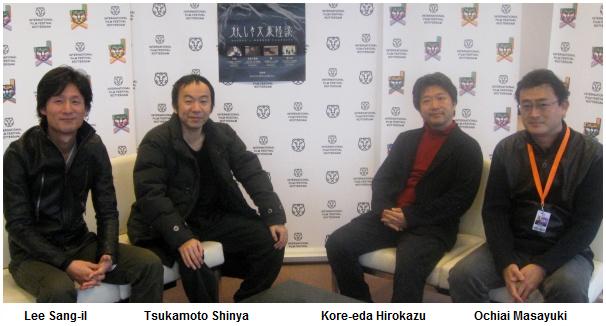
Pictured here are the fearsome foursome, ready for their series of IFFR interviews. The photo is by Silvana Petkovic as are the others, but more about that later...
AV: Thank you all for seeing me, I really appreciate it. All four of you are famous renowned directors in your own right. What moved you to work together on an anthology like this? Who wants to go first?
Ochiai Masayuki: I had been toying with the idea of filming Kawabata Yasunari's story "Kataude" ("The Arm") for a long time already. When I was approached by the producer from NHK, Mr. Hamano, we decided it would be interesting to take a documentary approach, presenting Kawabata to people who didn't know his writings really well. We tried to introduce the audience to his world and work. And this short story, one of his works of fiction, seemed to be a good way to bring it to people's attention.
AV: I thought that of the four stories in the film, "The Arm" was easily the most abstract and surreal. Definitely the farthest removed from what I would expect a "Kaidan" story to be.
Ochiai Masayuki: Of course, if you're thinking of the traditional stories, with ghosts, spirits and other supernatural beings of that kind. This story is more about the phantoms coming from disturbances within yourself. From your own fears. And how you handle those.
AV: What intrigued you about this story specifically?
Ochiai Masayuki: In Japan Kawabata is primarily known for his big literary novels like "Snow Country" and "House of the Sleeping Beauties". Not many people know that especially in his earlier years he also wrote stories like these. He was describing things like fetishism and I wanted to show that he had this side as well. I thought filming "The Arm" would be a good way to present this.
AV: Thank you! Mister Kore-eda, the same question for you please?
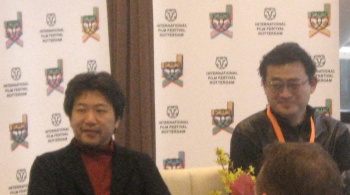 Kore-eda Hirokazu: For me, it happened like this: I was asked to participate in this anthology in August. And even as a child I always had the habit of watching horror and Kaidan movies in August while in December I used to always watch "47 Ronin". This became a pattern: samurai in December, Kaidan in August.
Kore-eda Hirokazu: For me, it happened like this: I was asked to participate in this anthology in August. And even as a child I always had the habit of watching horror and Kaidan movies in August while in December I used to always watch "47 Ronin". This became a pattern: samurai in December, Kaidan in August.
So when I was asked for this anthology in August I thought ah well, there is no possible way for me to refuse this! (we all laugh)
AV: My oldest son is of the same age as the "boy" in your segment, and I have to confess I was blinking away a few tears while watching. The story of those parents, their unimaginable grief and how they get solace from something that might just as well be a visiting child from the neighbors... it felt so true and believable.
The story also fits perfectly in your body of work. Which made me wonder: did all of you get to choose your own stories?
Kore-eda Hirokazu: Yes, we did. As for why I chose "The Days After" by Murô Saisei: this is not a well-known story even in Japan. But at the time, we're talking three years ago now, I had just become a father myself and I noticed I suddenly had a much greater affinity with this story. I had the impression that I truly understood the emotions and feelings of those parents, far better than I could earlier. The themes of parenthood in the novel attracted me.
On the one hand this tale is a family drama, showing a couple trying to cope with their loss, and the supernatural situation they find themselves in.
AV: I fully understand. When I became a father I felt I was suddenly part of the other half of the world, the half that had children.
Kore-eda Hirokazu: Hm, that is right.
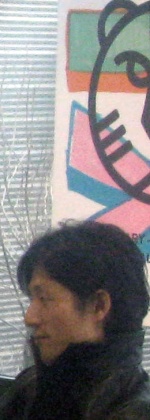 AV: Who wants to be next?
AV: Who wants to be next?
Lee Sang-il: When I was contacted, the other three were already attached to this project. When I heard their names I said yes, I have to join! (we all laugh)
Also it happened to fit in my schedule, I was available so I thought let's do this.
AV: And your choice of story?
Lee Sang-il: Honestly speaking I had a few other stories and other writers in mind at first, but after several discussions with the producer we chose Akutagawa Ryûnosuke. He is one of the writers I really like and have read many stories of, so two or three came to mind for this project and in the end we settled on "The Nose". Ehm, that's it.
AV: And that leaves...
Tsukamoto Shinya: Hmh, my turn... (we all laugh)
After the producer had visited me and had discussed the project I went to a bookstore to buy some books about literary Kaidan, my plan being that I would read a few stories and then pick one. But to my dismay the shelf for "literary Kaidan" was thiiiis wide. (gestures a span of over three feet)
Not only that, but those stories are written using the older Japanese symbols. This means you can't read them easily or skim them, it takes quite some effort and time to read them. I told the producer this was turning into a lot of work and he suggested focusing only on the really famous writers, but that still left me with five or six to choose from.
And of course I had to dismiss the ones the other directors had already chosen. I was quite cross when I heard Ochiai had taken Kawabata's "The Arm", because when I read the story it really interested me. I mean with all the fetishism in it... I thought damn! Now Ochiai is out there making the movie I ought to be making! (we all laugh)
Anyway, that story was gone and unfortunately I couldn't choose it anymore.
So then I arrived at Dazai Osamu and it struck me that while I liked his stories they had not much to do with either horror or Kaidan. But hey, it said "Kaidan" on the cover of the book so I guess it qualified. (we all laugh)
AV: In the past you have participated in other anthologies as well, like "The Jeonju Digital Project" and "Female". Is there something in particular that attracts you towards doing short stories in anthologies like these?
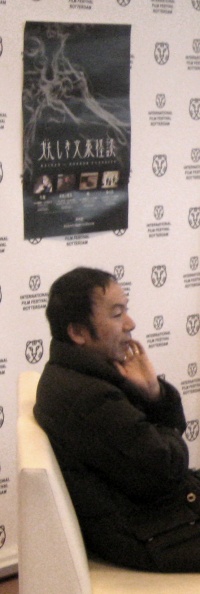 Tsukamoto Shinya: No, I don't have a specific preference for those. If by coincidence the project is interesting or feels right I will participate, but it's not like I'm actively searching out anthologies to do.
Tsukamoto Shinya: No, I don't have a specific preference for those. If by coincidence the project is interesting or feels right I will participate, but it's not like I'm actively searching out anthologies to do.
AV: I mean, it could be that people want to do anthologies because some stories might fit better in the short running time of an anthology segment instead of a full-length feature.
Lee Sang-il: No, not especially...
Tsukamoto Shinya: When given the chance I prefer to do full-length films because that allows you enough time to put in everything that you want.
Kore-eda Hirokazu: Although one of the benefits you DO get with this format is that you have more freedom to experiment. You can try out things you wouldn't dare do with a feature.
And I don't just mean storywise or content-wise. For example: this was the first time I ever worked with a digital camera. So to try out new technology like that I think this format really is fitting.
AV: Did you all have any contact with each other during the filming of the segments? More to the point, was there a bit of competition between you? (long silence, then we all laugh)
Ochiai Masayuki: No, in fact Kore-eda and I had never even met each other before yesterday at the airport.
Tsukamoto Shinya: I was very curious though. I kept wanting to check up on the others and ask: "What are you busy with?", but it was probably for the best that we left each other alone in our work.
There were a couple of questions I wanted to ask them but I thought better of it.
At one point I misheard a rumor that Kore-eda was in negotiations with an actress called Kawai Aoba, who is the leading lady in my segment. As it turned out he had been talking to Nakamura Yuri, but for a moment I thought "What?? Kore-eda is trying to steal my actress!". (we all laugh)
AV: The individual segments aired in Japan on television last August. How was it received and did you watch each other's episodes?
Tsukamoto Shinya: I have seen all of them, and I really enjoyed looking at what everyone had made.
Producer Hamano Takahiro, chiming in: We had lots of different reactions, many of them interesting and positive. The reviews were spread in all directions but on the whole people were favorable.
Ochiai Masayuki: I haven't been able to see them yet. I do not have satellite TV so I cannot receive NHK. (we all laugh)
But I have followed the reviews and several colleagues contacted me about the series, and in general I keep hearing people liked it a lot.
AV: I loved the film, and what struck me as well was that each segment had such excellent music scored for it. Was that a combined effort from the producer's side or did each director pick their own composer?
(All four together nod...)
Ochiai Masayuki: Each of us picked our own composer.
AV: The film has had a mixed reception here as well, yet I noticed that the people who liked it REALLY liked it. But the people who hated it told me they had expected typical J-horror based on the title, and they were disappointed to see sedate, gentle dramas instead of scares. Can you four gentlemen maybe come up with a better title for Western audiences? (they all laugh)
Ochiai Masayuki: That's more a question for the producer? (we all look at Hamano Takahiro)
Producer Hamano Takahiro: Well, be that as it may, the term "Kaidan" itself already means a lot more than what people consider as "J-horror".
Kore-eda Hirokazu: Exactly. That was actually one of the things that made me want to join this project, the fact that Kaidan can be something that is so different from J-Horror. I would never want to make a straight J-Horror film, also because I think I wouldn't be good at doing that. And I am glad that Kaidan-stories cover so many different topics and genres that I was able to find a story which I loved to work on.
And that unfortunately was all we had time for. Again I would like to thank the people of both NHK and the IFFR press-desk who made this meeting possible.
I would also like to thank Luk van Haute who was the translator. Apart from being able to speak Japanese he also has actual expert knowledge on Japanese literature. The fact that he knew exactly who the directors were talking about really helped me in writing this article.
Finally there is someone else who also needs a special thank-you: despite some desperate rummaging on my part during the interview, I could not manage to retrieve my camera from the bottom of my bag. I didn't want to upend the whole thing in the middle of someone talking (and Luk trying to listen) so the pictures included in this article are not mine. Instead, these photos were taken by the lovely Silvana Petkovic of NHK and therefore I thank her for allowing me the use of them.

Do you feel this content is inappropriate or infringes upon your rights? Click here to report it, or see our DMCA policy.






